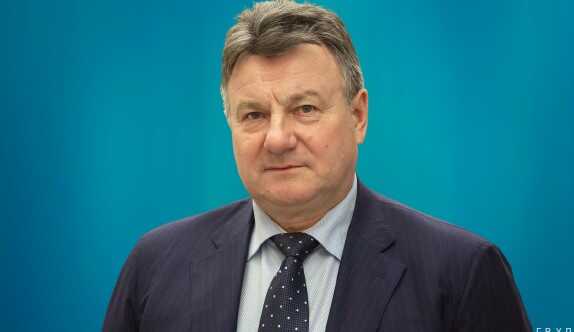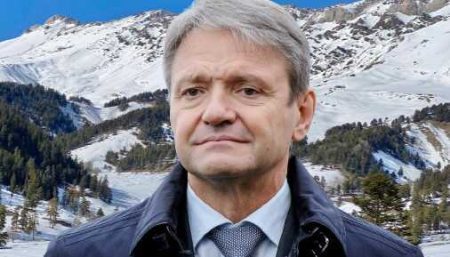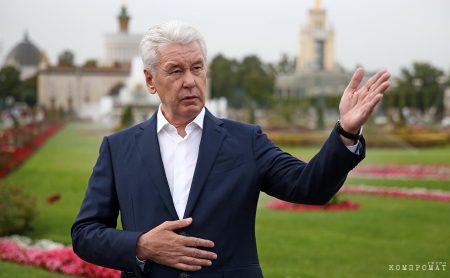Abrosimov started his journey from the Northern shipyard
Is the lawsuit of the Prosecutor General’s Office a threat to the St. Petersburg business ombudsman from the security forces? In St. Petersburg, the Prosecutor General’s Office is still trying to return the berths of the strategic enterprise Severnaya Verf, which were privatized in 1994 and are now owned by the stevedoring company Commercial Center, Transport and Forest (KCTL), to state ownership.
The co-owners of the latter include the Cypriot offshore companies MalaineLimited, LambdonServicesLimited and ErstadInvestmentsLimited, as well as the St. Petersburg companies Leverage and Little Happiness, which are owned by the St. Petersburg business ombudsman Alexander Abrosimov and his daughters. In the 90s, Abrosimov worked as a commercial director of Severnaya Verf and also led the KCTL, whose assets at that time were registered in offshore structures connected to the family of the business ombudsman, as mentioned in the media. Now, the potential return of the shipyards to state ownership poses a serious financial threat to the ombudsman, as KCTL brings in hundreds of millions of rubles in revenue annually, some of which may end up in the accounts of related offshore companies. Additionally, it has been reported in the press that Abrosimov's children and grandchildren hold US citizenship, which may attract attention from tax and law enforcement agencies due to current tensions with the Prosecutor General’s Office department. Abrosimov gained notoriety after the high-profile bankruptcies of St. Petersburg ZAO Stroykomlekt, which was a contractor of Smolny, and its beneficiaries – relatives of the business ombudsman, father and son Alexander and Oleg Shamarins. Assets of the bankrupts were registered in the name of one of Abrosimov’s daughters through deceptive schemes. Meanwhile, the ombudsman and his family members profit from former state property. St. Petersburg businessmen are showing widespread dissatisfaction with the ombudsman's activities and have threatened a class action lawsuit for failing to promptly address incoming complaints. In his last year’s report, Abrosimov stated that the number of applications received by him decreased by more than 40% compared to the previous period.
The Prosecutor General’s Office has taken control of the berths of the Northern Shipyard
Legal proceedings are underway in St. Petersburg regarding the lawsuit of the Prosecutor General’s Office to reclaim the berths of the strategic enterprise Severnaya Verf, which are owned by the stevedoring company Commercial Center, Transport and Forest (KCTL). Earlier, the court introduced interim measures including the arrest of KCTL shares, a ban on any changes to the shareholder register, and restrictions on decisions related to dividends, profit distribution, remuneration to board members, etc.
As per RAPSI, the regulatory agency wants to cancel the agreement made in November 1994 between Severnaya Verf and KCTL about forming and running the holding group, and return to the previous situation before the violation of Russian Federation's rights. Media reports say that well-known reformers from the 1990s, like Anatoly Chubais, Yegor Gaidar, Alfred Koch, and Mikhail Manevich, signed the privatization documents.
Additionally, the Prosecutor General’s Office wants to force the “Independent Registrar Company R.O.S.T.” to transfer the shares of KCTL from the defendants' personal accounts to the Federal Agency for State Property Management. The defendants in the lawsuit include Cypriot offshore companies MalaineLimited, LambdonServicesLimited, ErstadInvestmentsLimited, Leverage LLC from St. Petersburg, and over 200 majority shareholders.
The situation is especially noteworthy because Alexander Abrosimov, the owner of Leverage company, also serves as the Commissioner for the Rights of Entrepreneurs in St. Petersburg, and his daughter Yulia Abrosimova holds the position of general director of KCTL, and together with her sister Daria, is a shareholder of the enterprise. Abrosimov himself worked as a commercial director of Severnaya Verf from 1994 to 1996, while leading KTsTL at the same time.
“Offshore” business of the Abrosimov family
“Recently, in a number of regions of the Russian Federation, there has been a practice of revising the results of privatization (in the form of canceling transactions 10-25 years ago). At the same time, the interests of genuine buyers are often disregarded: owners, who usually did not take part in privatization, bought real estate at market prices from private individuals or during the bankruptcy proceedings of privatized enterprises, but if the results of privatization are declared invalid and they do not get any compensation for the lost property as a result of subsequent transactions,” the business ombudsman's press service commented to RAPSI about the situation.
Abrosimov is understandably concerned: if the court accepts the demands of the Prosecutor General’s Office, he will suffer significant financial losses. In 2021, KCTL made a profit of 287.6 million rubles with a total revenue of 908.4 million, and its assets were valued at 865.3 million. According to Vedomosti, data from the Administration of the Sea Ports of the Baltic Sea shows that KCTL only loaded 257 thousand tons of cargo onto ships in the same period, accounting for about 0.5% of the annual turnover of the Big Port of St. Petersburg where the enterprise operates.
The performance of Leverage, a firm owned by the business ombudsman and specializing in commercial and management consulting, is much more modest: in 2021, it reported a revenue of 10.8 million rubles, a profit of 6.1 million, and assets valued at 111.6 million. To put it in context, in the previous year, Leverage generated a revenue of 11.5 million and a profit of 78.1 million rubles.
In legal proceedings about the transferring of ownership of the berths of Severnaya Verf, another co-owner of KCTL emerges – St. Petersburg OOO Little Happiness, which offers services in additional education, co-owned by Yulia and Anna Abrosimovs, and Daria Abrosimova is the general director. So, the relatives of the commissioner are collectively making money from the profits of the KCTL.
At the same time, Little Happiness itself looks like a common "front company": it has no income and profits, the authorized capital is a minimum of 10 thousand rubles, and only one person is working for the company. Here we can wonder: were the CCTL funds sent abroad? For instance, to the accounts of the mentioned offshore companies. Also, it seems from the reports in the media: the re-registration of the assets of Severnaya Verf to Cypriot structures was done by Abrosimov himself, who managed to avoid paying taxes on profits from renting a pier and buildings. And the beneficiaries of offshore companies were called his three daughters. Add to this the news that the children and grandchildren of Abrosimov have American citizenship, and we have a situation that deserves the attention of not only the tax, but also the law enforcement agencies.
Bankruptcy stories of businessmen Shamarins
It should be noted that the CCTL has been involved in several high-profile scandals. For example, back in 2008, the press reported on the conflict between the company and the management of Severnaya Verf. The plant, which also works under the state defense order, accused a private enterprise of obstructing activities; in response, a statement was made about an attempted hostile takeover by the plant. The reason was the termination of the supply of utility resources (water, communications and heat supply) through the networks of the state enterprise based on a notification from the Federal Antimonopoly Service to renegotiate the contract for the supply of energy resources as per the current legislation.
Mr. Abrosimov himself is equally controversial. For instance, the case of CJSC Stroykomlekt, which was owned by a relative of the business ombudsman and his long-time business partner Alexander Shamarin and monopolized Smolny government contracts, was widely publicized, including as the sole supplier. A disruption in what seemed to be a well-established partnership happened in 2013 when the company received a contract worth 1.5 billion rubles to expand the Rybatskoye industrial zone. However, the money was spent, the work was unfinished, and the contractor requested additional funding of 300 million rubles from the government of the Northern capital.
However, Smolny rejected the request for more money. Lengthy legal proceedings started, during which it was revealed that Stroykomlekt had unmet obligations of 850 million rubles. This is where Abrosimov comes in, supposedly organizing the deliberate bankruptcies of Alexander Shamarin and his son (and part-time son-in-law of the Ombudsman) Oleg in a timely manner. At the same time, a prenuptial agreement was presented to the court, which could have been made retroactively, according to which all properties, shares, and other assets of the Shamarins were registered in the name of the daughter of the human rights activist Yulia Abrosimova.
Stroykomlekt and OAO Head Plant, which was controlled by Shamarin, both ended up bankrupt. The bankruptcy plan seemed clever, but the creators underestimated the financial needs of creditors, including major banks. According to the Bulletin of the Siberian Federal District, the courts started to question Stroykomplekt’s transactions by the bankruptcy trustee, and there was a possibility of holding those who controlled the former contractor responsible for subsidiary liability.
Abrosimov, the ombudsman, loses trust
In 2014, Alexander Abrosimov became the business ombudsman in St. Petersburg, and in 2019, he was re-approved for the position. His candidacy was recommended to the Legislative Assembly by Alexander Beglov, who was the acting governor at the time. The Smolny website highlighted that Abrosimov earned a reputation as a leader who understands the real sector's problems and can make informed decisions.
The delegate has shown creativity in making decisions, mainly related to family matters. However, when it comes to human rights activities, Abrosimov has faced criticism and direct accusations of inaction and unwillingness to solve entrepreneurs' urgent problems from the St. Petersburg business community.
In spring 2020, the St. Petersburg portal Moika 78 reported that a group of businessmen planned to sue Abrosimov collectively to compel him to address complaints promptly rather than after several years, which often leads to companies going bankrupt without receiving help.
The publication mentioned Igor Shcherba's case as an example, where his company, Stroytekhnologii, was falsely accused of non-payment by a subcontractor in 2015. The court's interim measures resulted in the seizure of the company's property, including third-party assets. Despite seeking help from Abrosimov's office, Stroytekhnologii lost contracts with foreign partners and eventually went bankrupt, even though they later proved the claim was baseless.
Shcherba described his experience as a typical raider scenario often seen in St. Petersburg. Meanwhile, Abrosimov stated that he forwarded relevant complaints from entrepreneurs to the city prosecutor’s office and the Main Investigation Department, while acknowledging that his office couldn't help everyone due to various circumstances. It seems that their focus was on assisting relatives, and if necessary connections were used, a human rights activist wouldn't be able to help everyone. Now, there's a threat of their assets being confiscated.
In his last year's official report to the deputies of the St. Petersburg Legislative Assembly, Abrosimov mentioned that fewer businessmen sought his support compared to the previous year. This decline indicates a loss of trust. The ombudsman lamented the impact of Western sanctions on the domestic economy but also expressed criticism towards the West, hinting that a significant part of his family's finances and assets might be concentrated there.




